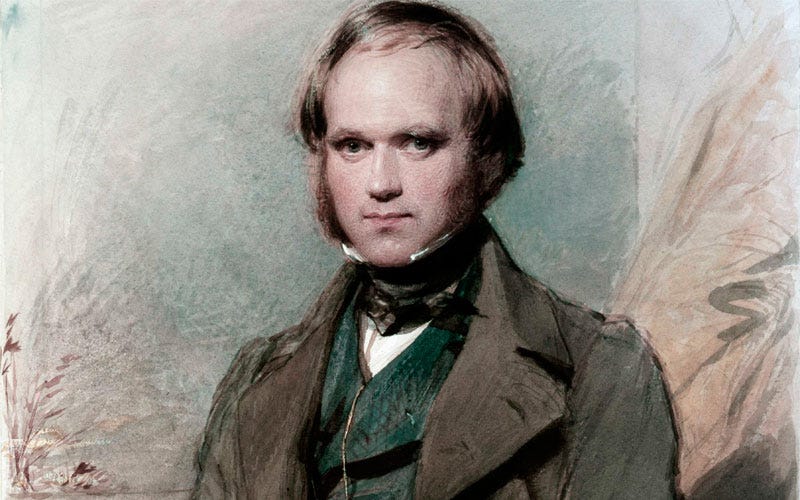How To Be Charles Darwin
Nine Darwinian Habits of Mind and Behaviour
Catch-up service:
The Story Behind Prince’s Solo
My Book Of the Year
Are Americans Growing Less Comfortable With Speaking Up?
Is Forgiveness a Power Move?
20 Observations On Friendship
Earlier this year I read a biography of Charles Darwin by Adrian Desmond and James Moore. I was a little sceptical that a book written by two people would be a good read but it’s one of the best biographies I’ve ever read. They do a superb job of setting Darwin’s earthshaking ideas in the religious and political context of nineteenth century England. They also bring him to life as a person, helped by his prodigious letter-writing and note-taking; there are few if any great scientists of whom we have a such a close and intimate view.
The authors do all this without sacrificing readability; the book has great forward momentum, even during the thirty years when nothing much happens because Darwin has pretty much worked out his theory but doesn’t want to publish it for fear of cancellation. It helps that Darwin is pleasant to spend time with: along with Einstein, probably the most likeable, decent and well-rounded of the great scientists.
He is strikingly different from Einstein, however, in that he’s not obviously a ‘genius’ in the sense we usually wield that term. Darwin was clever and diligent but not unfathomably brilliant or visionary. He didn’t seem to exist on some other intellectual plane from the rest of us, like Newton or von Neumann. Darwin achieved possibly the most momentous scientific advance ever made through the persistent application of good intellectual habits. Some of them we might even be able to emulate, even if we can’t emulate him. Here are nine:
Be a T-shaped learner. Darwin, partly because he had the good luck to born well off, never really buckled down to his university studies, or set his sights on a profession (he did want to be a curate for a while but mainly because he thought it would give him to time to pursue his investigations into nature). His academic performance was mediocre. Until he joined the Beagle expedition, he seemed to be drifting through life, somewhat frivolously. His father said to him, “You care for nothing but shooting, dogs, and rat-catching and you will be a disgrace to yourself and your family.” Thanks Dad. That must have been hurtful, but Darwin had noticed something about himself: “I had strong and diversified tastes, much zeal for whatever interested me and a keen pleasure in understanding any complex subject of thing.” He never lost his intense, childlike enthusiasm for things that interested him, and for puzzles to solve. The writer and activist Harriet Martineau, who was close to Darwin’s brother Erasmus, described Charles in four judiciously chosen adjectives: “simple, childlike, painstaking, effective.”
Darwin developed his instincts into a method of thinking that today we call “T-shaped”. T-shaped learners are specialists in one field but take time to learn about a range of other subjects. Everything in the top of the T feeds into the stem, making the specialist’s thinking richer and more original. Darwin’s speciality, of course, was biology (‘natural history’) but he was also deeply interested in geology, and took from his friend Charles Lyell the insight that large changes could occur in tiny increments over thousands or millions of years. He read about economics, and applied Thomas Malthus’s ideas about how people compete for survival to the animal world. He was an investor in industry, and married into a family, the Wedgwoods, who pioneered factory production lines. From there he took the idea that there was a division of labour in nature; that different species might evolve to exploit different niches.
Darwin read incessantly and widely and took notes. A group of researchers recently performed a quantitative analysis of his reading choices. What they found is that as Darwin’s career went on, instead of reading more narrowly - which is what you might expect, as he settled into his specialism - he read more and more widely. He sought, say the researchers, “an unusually high level of cognitive surprise”. Darwin’s peers in biology did not have anything like his breadth of curiosity.Be suspicious of belief. Darwin was born into a nonconformist, Unitarian family. His family’s dissenting relationship with the Anglican Church was part of what enabled him to conceive of and pursue his heretical ideas about species. Although he remained sympathetic to Christianity, he gradually lost his faith as the implications of his work sunk in, though he never became a committed atheist, as some did. That’s because he just didn’t have the temperament of a believer. Unlike many people, religious or otherwise, Darwin didn’t enjoy believing. Of course, we all have to believe things, and Darwin was confident in his ideas. But as he once said, when writing about a book by a young theologian he admired, “I simply feel, that I cannot believe…in the same spirit.” I don’t think he was referring just to Christianity here. Belief wasn’t his goal. It was a byproduct of his empirical investigations; something he backed into with wariness and reluctance.




